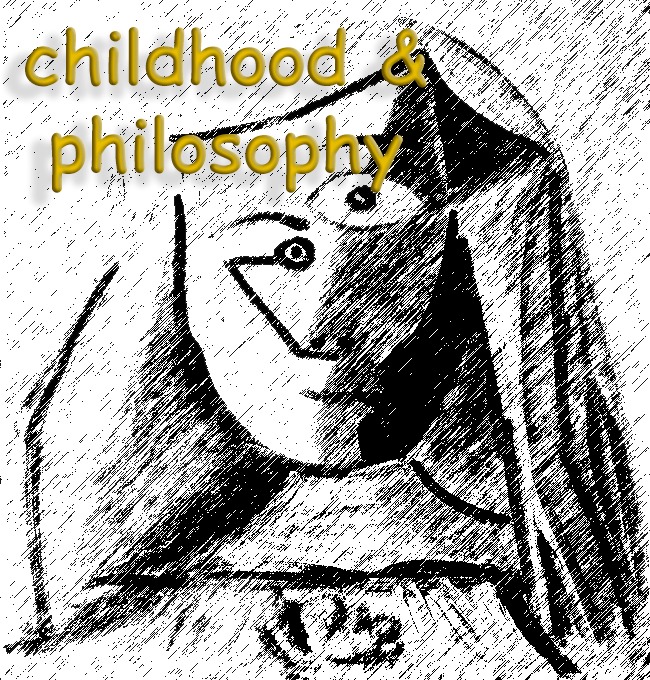i am keeping my cultural hat on: exploring a ‘culture-enabling’ philosophy for/with children practice
DOI:
https://doi.org/10.12957/childphilo.2021.54161Keywords:
philosophy for/with children, culture, marginalization, culture-enabling practiceAbstract
In this paper, I offer a preliminary sketch of a culture-enabling Philosophy for/with Children practice. It is an approach to engaging philosophically with children that aims to encourage the exercise of critical reflection at the level of their respective cultures. This kind of P4wC practice hopes to address the challenges in facilitating philosophical dialogues with culturally/ethnically-diverse groups, especially when prejudice and negative stereotypes towards cultural/ethnic minorities are prevalent. Its focus is on helping children become cognizant of their cultural situatedness and its impact on their thinking and attitude towards dialogue. Underlying this practice is the assumption that Philosophy is fundamentally a worldview and a method that is embedded in the culture where it is created, validated, and used. Such a manner of doing philosophy recognizes that children are active bearers of culture and are entitled to educational opportunities, like P4wC, that can empower them to think for themselves and with others while staying grounded on their cultural backgrounds. Thus, the Community of Inquiry functions as a caring space where intercultural understanding and critical affirmation of cultures are fostered and sustained. In connection, I suggest that a culture-enabling P4wC teacher should have three desired traits: a) openness to various cultural resources and frames, b) a sense of critical positionality, and c) partiality to the culturally marginalized.
References
Alcoff, Linda. “Cultural Feminism versus Post-structuralism: The Identity Crisis in Feminist Theory.” in Signs, Vol. 13, No. 3, 1988, pp. 405-436
Bruya, Brian. “Ethnocentrism and Multiculturalism in Contemporary Philosophy,” in Philosophy East and West, Volume 67, Number 4, 2017, pp.991-1018.
Echeverria, Eugenio “Philosophy for Children with indigenous children.” in Children Philosophize Worldwide: Theoretical and Practical Concepts, Frankfurt am Main: Peter Lang, 2009, pp.663-668.
Elicor, Peter Paul. “Resisting the ‘View from Nowhere’: Positionality in Philosophy for/with Children Research,” in Philosophia International Journal of Philosophy, Vol. 21, No.1, 2020, pp.19-33.
Gatmaytan, Augusto B. “The Hakyadan of Froilan Havana: Ritual Obligation in Manobo Religion,” in Philippine Studies, Vol. 52, No. 3, Nature-Culture, 2004, pp. 383-426.
Gay, Geneva. Culturally Responsive Teaching: Theory, Research, and Practice. New York & London: Teacher College Press, 2000.
Hong, Ying-yi, Michael W. Morris, Chi-yue Chiu, Veronica Benet-Martinez. “Multicultural Minds: A Dynamic Constructivist Approach to Culture and Cognition,” in American Psychologist, Vol. 55, Number 7, 2000, pp.709-720.
Jackson, Thomas. “Homegrown.” in Educational Perspectives, 44 (1&2), 2012, pp.3-7.
Kohan, Walter Omar. “The Origin, Nature, and Aim of Philosophy in Relation to Philosophy for Children.” in Thinking, 12(2), 1995, pp.25-30.
Kohan, Walter Omar, “Paulo Freire and Philosophy for Children: A Critical Dialogue,” in Studies in Philosophy and Education, May 2018, https://doi.org/10.1007/s11217-018-9613-8
Makaiau, Amber Strong. “Philosophy for Children Hawai’i A Culturally Responsive Pedagogy for Social Justice Education,” in Inclusion, Diversity, and Intercultural Dialogue in Young People’s Philosophical Inquiry, edited by C.-C. Lin & L. Sequeira, Rotterdam: Sense Publishers, 2017, pp. 99–110.
Oliverio, Stefano. “Intercultural Philosophy and the Community of Philosophical Inquiry as the Embryonic Cosmopolitan Community.” in Inclusion, Diversity, and Intercultural Dialogue in Young People’s Philosophical Inquiry, edited by C.-C. Lin & L. Sequeira, Rotterdam: Sense Publishers, 2017, pp.3–14.
Preece, Abdul Shakour & Adila Juperi. “Philosophical Inquiry in the Malaysian Educational System –Reality or Fantasy?” in Analytic Teaching and Philosophical Praxis, Volume 35, Issue 1, 2014, pp. 26-38.
Qin, Dongxiao. “Positionality,” in The Wiley Blackwell Encyclopedia of Gender and Sexuality Studies, First Edition, edited by Nancy A. Naples, JohnWiley & Sons, Ltd., 2016.
Santi, Marina. “Doing Philosophy in the Classroom as Community Activity: A Cultural-Historical Approach.” in childhood & philosophy, Vol. 10, No. 20, 2014, pp.283-304.
Maher, Frances A. and Mary Kay Tetreault. “Frames of Positionality: Constructing Meaningful Dialogues about Gender and Race.” in Anthropological Quarterly, Vol. 66, No. 3, 1993, pp. 118-126.
Tibaldeo, Roberto Franzini. “Responsibility Towards Diversity: An Educational Proposal for the Enhancement of Democracy,” in Intercultural Education and Competences Challenges and Answers for the Global World, edited by Agostino Portera and Carl A. Grant, Newcastle: Cambridge Scholars Publishing, 2017, pp.115-128.




